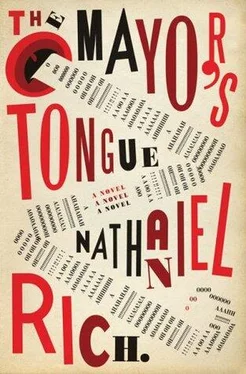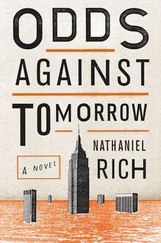"Do you think you might be willing to translate it?"
Eugene squinted, trying to divine the meaning of his friend's words.
"It looks like you've worked very hard on that. You should be proud."
Alvaro frowned.
"But do you think you might be willing to translate it?"
"I do like the way it sounds. Like some enchanting Mexican song."
The two men stared at each other baffled. Eugene had never seen his friend this stubborn. Alvaro sullenly walked back to his side of the room and let his manuscript fall to the table. Although they were laughing again by the time they left the library, Eugene felt responsible for their mutual incomprehension. Alvaro wanted to ask him something urgent, but Eugene couldn't figure out what.
The next night at the library, Alvaro couldn't concentrate on his manuscript. He strolled past the bookshelves, pretending to read the titles, and then ripped from his legal pad a fresh piece of paper. He wrote deliberately in a large, stiff hand, referring often to his old draft. Eugene watched as wrinkles formed on Alvaro's face in places he had never seen them. A culvert indented the patch of skin under his nostrils, faint gullies coursed along his jaws, and a network of trenches disfigured his forehead. Still frustrated by their miscommunication a day earlier, Eugene pretended not to notice.
Alvaro walked the length of the table and slid the yellow lined paper over the book that Eugene was pretending to read. When Eugene looked up, Alvaro was smiling, eager. The script was neatly written, but no more comprehensible for it. Alvaro pointed to the manuscript, and then to Eugene. He continued to repeat this gesture while he spoke.
"I would like you to translate it. Do you understand me?"
"Is this a story?"
"Please understand what I am saying to you, Eugene."
"Do you want me to. . translate it?"
"Translate it," said Alvaro, nodding. His eyes flashed black.
"But Alvaro, I can't speak Spanish, let alone Cibaeño."
Alvaro took the Eakins book out of Eugene's hands. He slammed it shut and, with a dramatic flourish, threw it against the wall.
"Translate it. Please, Eugene, please translate it into English. Otherwise, it will be lost forever. Almost no one here understands my dialect, but I think you can."
Eugene began to read the dense scrawl, wondering what kind of story Alvaro would write. He pulled out his own notebook and laid it side-by-side with Alvaro's. Then Eugene began to write himself, stopping every sentence or so to consult Alvaro's text. Alvaro watched all this closely, encouraging his friend whenever he looked up. The further Eugene went along, the less convinced he became that he was getting it right. But Alvaro looked on with such a hopeful expression that Eugene started to believe.
The story that began to take form on those pages seemed to be at least partially autobiographical in nature. The narrator was an immigrant from Jamao, a village in the Cibao Valley of the Dominican Republic. Like Alvaro, the man, who Eugene determined was named Jacinto, spoke in the Cibaeño dialect. Jacinto had moved to an apartment in northern Manhattan with another man, who was a depressed, fatherless loner. Jacinto was very poor, so he took a job as a moving man. This was unfortunate, because he had been one of the more prominent young men in Jamao, a member of the priest caste and the village's only surgeon. He delivered babies and issued last rites, performed exorcisms and blood transfusions. He taught children the Bible and cleaned their scraped knees with an astringent he distilled from a black mountain berry that he himself had discovered.
But Jacinto had been unhappy in Jamao, and craved a larger existence. He dreamt of a vast metallic metropolis, with spires rising from cathedral-like structures made of steel. He imagined hundreds of people tripping over one another, and tunnels that formed a secret network under the city like the caves dug out by moles, except these tunnels extended not only deep below the earth but also straight up, to the top of the highest buildings. Jacinto boarded a boat to Santo Domingo and then a flight for New York City. Once he arrived at the apartment, several rote secondary characters were granted introductions: a wicked old landlady, a boisterous, incoherent drunk, and an infant who might or might not be the Son of Man. They all lived together in a large high-rise in Inwood.
The real action begins when Jacinto meets Alsa. She's the teenage daughter of a downstairs neighbor, who is also from Cibao. Alsa is beautiful and plump, with straight black hair that hangs below her waist. When she smiles, which is often, she has a habit of covering her mouth, until she gives way to laughter and breaks out in loud, irrepressible bursts. Eugene hoped very much that Alsa would fall in love with Jacinto.
Eugene completed translating this opening section of the story several weeks later, on an unseasonably mild night in April, relying heavily on guesswork, intuition, and the fragments of knowledge he was able to gather about his friend. When he was done, he read it aloud to Alvaro, who, despite his incomprehension of the English words, listened with an ecstatic expression on his face. Alvaro kept interrupting in order to shake his hand. Eugene began to suspect that his translation might have been accurate after all.
He was amazed. It was a rare and mysterious thing when two people could understand each other with such perfect clarity.
Rutherford and Mr. Schmitz sit smoking on a public bench at the northern edge of Central Park, trying not to exhale into each other's face.
"Rutherford," says Mr. Schmitz, "I've started writing down the story of my life."
"The story of your—"
"The ENTIRE story of my life."
"I don't remember you ever writing down so much as a grocery list. Even your checks are signed by Mrs. Schmitz."
"I'm already in the middle of writing the first chapter, the story of my birth. After this, I will chronicle my childhood, my young adulthood, my advanced adulthood, and finally, my maturing years. I'm telling you this in absolute confidence. Lock and key."
Rutherford accidentally coughs a cloud of smoke into his friend's face.
"You're writing about your own birth? What could you possibly have to say about it?"
"I have a vivid memory of my own birth." Mr. Schmitz exhales slowly and rests his chin against his great boulder of a chest. "I even remember what happened before I came out."
Rutherford flicks his cigarette against the back of the green wooden bench, and waits.
"There were milky red-and-black clouds swirled up all around me, and I was suspended in a substance that had the consistency of fruit preserves."
Rutherford frowns, watching as Mr. Schmitz's eyes converge slightly.
"Under the strongest lock and key. Listen to my story."
"I'm listening."
"When I came out, I entered a state of mild shock. I couldn't even cry. I felt only that I was being pushed on from all sides, like I was caving in. When the doctor slapped me, the pressure burst. I was never the same afterward. I was a new person." He scratches his cheek. "This is all included in the first chapter."
Rutherford regards his friend's profile. Mr. Schmitz wears an undersized yellow checked jacket over a collared T-shirt and a bright speckled tie. An oily stain in the shape of Michigan peeks out from beneath his belly whenever he sits up straight, which is often. He has flat, happy eyes and is fond of rubbing his chin. He has combed his sandy hair loosely to one side, with an air of studied tidiness that is disrupted only by a single recalcitrant tuft that ribbons up behind one ear. His rigid sedentary pose was acquired over a half-century earlier at the Menno Simons Schoolhouse of Lancaster County, Pennsylvania, where he took a course every morning called Rectitude; the robust nuns lashed the students' curved backs with aluminum metric rulers.
Читать дальше












